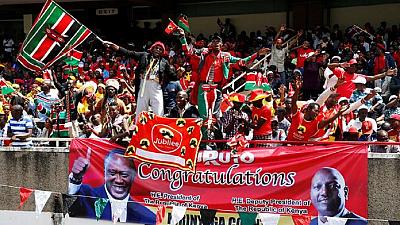The recent revelations about the role played by British spin doctors, Cambridge Analytica, in Uhuru Kenyatta’s campaigns during the last two elections in Kenya have caused a bit of an uproar. Though long rumored -and hotly denied by Jubilee Party mandarins – the confirmation delivered via hidden camera was jarring not only for the extent of their involvement, but also for their underhand methods.
However, the fuss around Cambridge Analytica has tended to obscure the fact that, even without their involvement, spin and deception have been made into a way of conducting the nation’s business.
Take, for example, the recent online proclamations by the ever publicity-seeking Kenya Film Classification Board that it had bagged a global award, the grandly named Arch of Europe. According to the citation, the award was in recognition of the KFCB’s “immeasurable contribution to the business world” and its “high outstanding professionalism demonstrated by prestigious performance”. Sounds good, eh?
However, a little digging turns up some unsavory facts that the Board’s CEO, Dr. Ezekiel Mutua, would rather you didn’t notice. The organization issuing the award, the Madrid-based Business Initiatives Directions, along with six other organizations, had been investigated in 2014 by the Center for Investigative Reporting of Serbia (CINS) and the Organized Crime and Corruption Reporting Project (OCCRP) and their awards found to be, in many cases “bogus, sold by unscrupulous organizations that prey on human vanity”.
The investigation found that “giving” awards had become a lucrative enterprise. “The organizations that provide these awards are nearly always based in European Union countries and mostly market their awards to developing countries”. And the clue is in the word “market”. As the report states, while the organisations claim to do their research to find the best awardees “in reality in most cases they send out hundreds of email invitations and some even allow applicants to nominate themselves on organization websites. Anyone who replies, shows interest and agrees to pay gets an award.”
Basically, KFCB may have simply bought itself an award and then taken to Twitter to parade it as a marker of excellence. And in case you were wondering, the CINS/OCCRP report found that such awards do not come cheap. “In Serbia and Bosnia and Herzegovina, around 50 public institutions received these awards. Some paid for multiple awards at prices that ranged from € 2,000 to more than € 7,000 (US$ 2,500-9,300) per prize.” That means close to a million of your tax shillings may have been expended in assuaging the egos of the folks at KFCB.
Lest one thinks that this is a unique case, a public statement has just been released by the Hamburg Media School, makers of the Oscar-nominated Kenyan film, Watu Wote, which apparently gives the lie to the KFCB’s and Dr. Mutua’s assertions that the latter attended the 90th Oscars Academy Awards ceremony in the US earlier this month. “Dr. Mutua was not in attendance at the ceremony and did not participate in the Oscars with us. He never received an invitation,” says the statement, which was posted on the film’s Twitter account. It also says that a KFCB-sponsored screening of the movie in Las Vegas, again trumpeted by the Board as highlighting “opportunities available for investments in the film industry in Kenya”, was actually done in violation of the school’s copyright and without their permission.
Perhaps Dr. Mutua has picked up this habit from his boss. As the saying goes, the fish rots from the head. Many will recall the “Mandela Prize” that President Kenyatta was awarded last December for apparently demonstrating a true spirit of democracy when he accepted the Supreme Court to annul the August 8 election. “To put it simply, ‘the Mandela Prize’ is bogus,” concluded a 2016 investigation by the Moroccan news website, Le Desk, after Mohammed VI, King of Morocco, “won” it that year. It is not to be confused with the legit UN Nelson Rolihlahla Mandela Prize, which awarded once every five years as a tribute to the outstanding achievements and contributions of two individuals from each gender.
Kenyatta’s “Prize” also came from a fishy outfit, the Paris-based Mandela Institute, which, despite its name, has nothing to do with the late Nelson Mandela other than the claim that its Honorary President, Olivier Stirn, was his friend. Stirn himself has a chequered past, having been forced to resign in disgrace from the French cabinet in 1990 after he was caught hiring unemployed actors, students and day laborers to pose as an audience for senior Socialist Party speakers at a sparsely attended conference.
More recently, during the President’s state visit to Cuba, his spin doctors announced that the Cuban government had honoured his late father, Jomo Kenyatta, “as a towering figure in African and Caribbean liberation movement” by placing his bust at the Park of African Heroes in Havana. However, what they did not mention was that, as Dr Wandia Njoya has pointed out on Twitter, the plaque on the bust doesn’t mention fighting for freedom and, perhaps more importantly, that the busts there are sometimes donated by African governments themselves. Crucially, there was no mention of who was paying for this particular bust.
So as we express our outrage at Cambridge Analytica’s corruption of our democracy, we must not deceive ourselves that what they were doing is somehow different from the everyday actions of our public officials. From fake wars against corruption, to our invented ethnicities to the farcical Head of State commendations, Kenya is a state that was built on, and that is largely sustained by, lies and deceptions.



